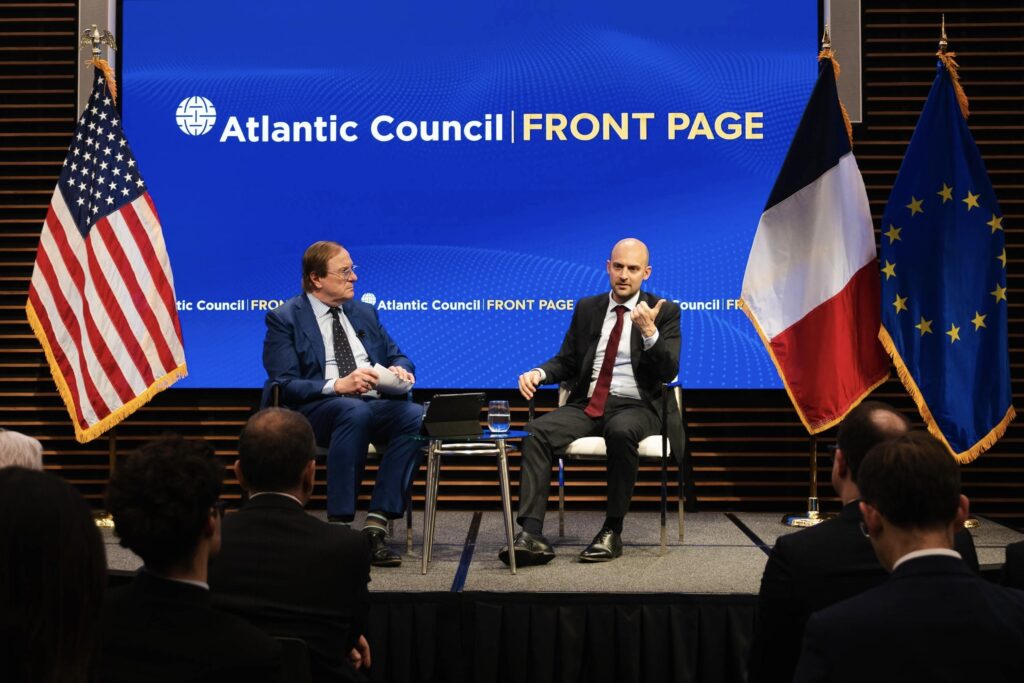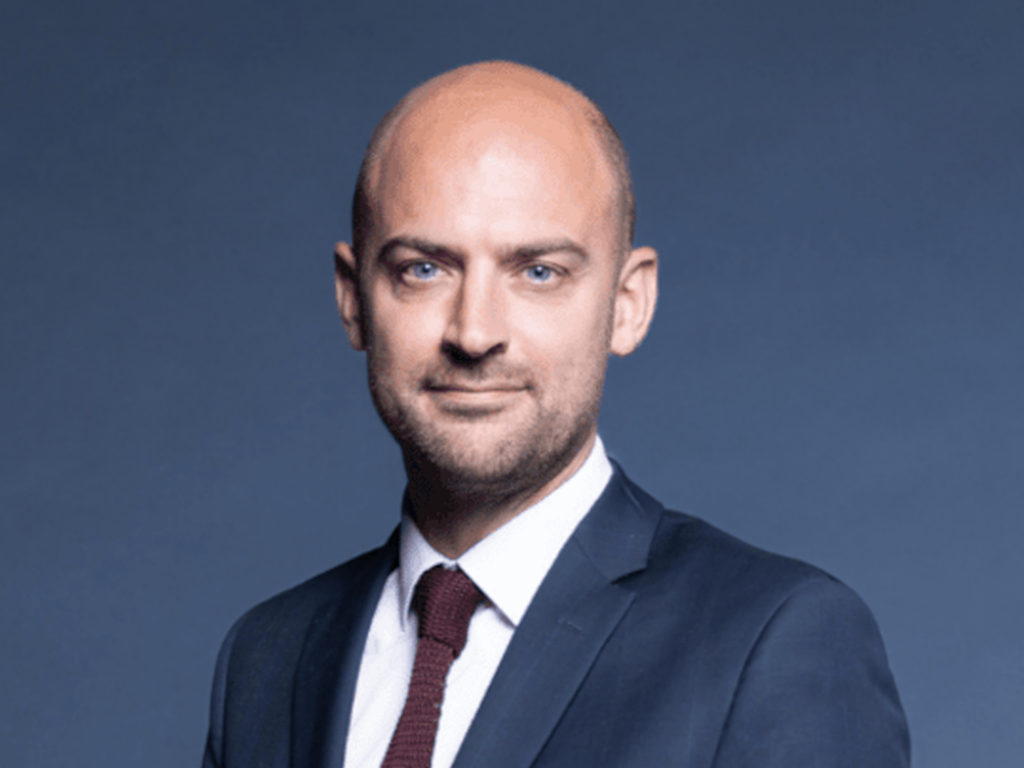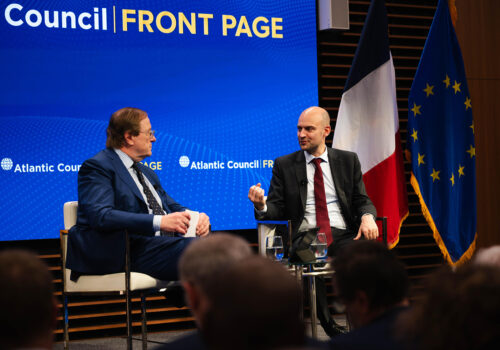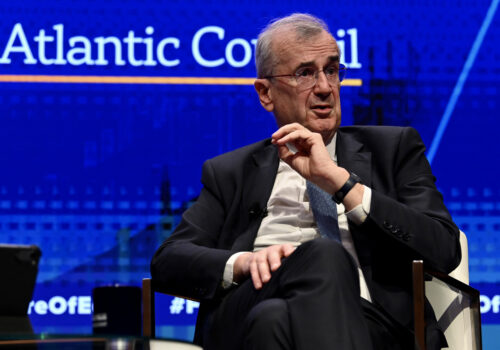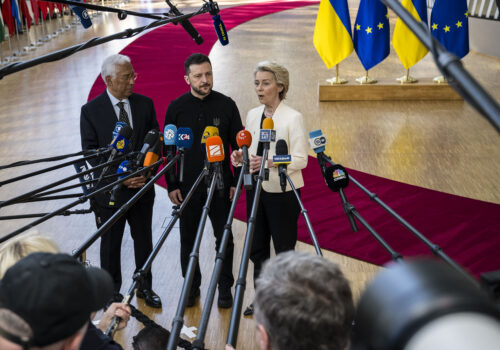Watch the full event
“Multilateralism will survive whether or not the US quits multilateralism, and so someone will fill the void,” said French Minister for Europe and Foreign Minister Jean-Noël Barrot at an Atlantic Council Front Page event on Thursday. China, he warned Washington, is already preparing to “become the new hegemon of this new era of multilateralism” if the United States were to “decide to let them play this role.”
Speaking against the backdrop of the Trump administration’s sweeping tariffs that have upended the global trading system and strained relations with US allies, Barrot cautioned the United States from pulling back from the multilateral system it helped build. Instead, he said, “a better route” would be “reforming, reshaping multilateralism.”
He said this would require being willing to “share the power in order not to lose it” by expanding representation in the United Nations Security Council (UNSC) and international financial institutions. It will also require being “ready to build coalitions of the willing to overcome obstruction” in international institutions such as the United Nations and the World Bank. “This is the new era of multilateralism,” he said, a route “that Europe is hoping to take alongside the United States of America.”
The French foreign minister also laid out his vision of European strategic autonomy. While Europe should be committed to the rules-based international order, in a more “brutal world,” he said, “you’re going to need to be much stronger, much less dependent on other regions” to uphold the values of freedom and democracy. “We see our strategic autonomy as a way to defend” the rules-based multilateral model.
Below are more highlights from Barrot’s remarks and discussion moderated by Atlantic Council President and CEO Frederick Kempe.
Ukraine negotiations
- Barrot praised the US-Ukraine critical minerals agreement signed Wednesday, calling it “a very good agreement for Ukraine and also for the US.”
- Barrot noted that by signing the agreement and by earlier agreeing to a US-proposed thirty-day cease-fire, Kyiv had met the Trump administration’s demands in Ukraine-Russia peace negotiations. Meanwhile, he said, Russian President Vladimir Putin has not shown “any signal, any sign of willingness to comply with the requests” of the Trump administration. “Right now, the main obstacle to peace is Vladimir Putin,” he said.
- Barrot said that Europe understands that the United States is “counting on us to bear the burden” of providing security guarantees to Ukraine after the war ends. But he added that this “coalition of the willing” led by France and the United Kingdom will “need to be honest” with the United States “once we’ve done our homework” and know what capabilities only Washington can provide to deter Russia from further aggression against Ukraine.
Iran nuclear talks
- Barrot said France has been coordinating with the United States “from day one” on the Trump administration’s negotiations with Iran, whose nuclear program he called a “major threat to our security interests.”
- He said that there is “no military solution to this issue” of Tehran’s nuclear program and that it can only be resolved diplomatically. He added that if there is no deal “sufficiently protective of our security interests” by the summer, then France will “not hesitate to reapply all the sanctions” it lifted against Iran a decade ago when Tehran signed the Joint Comprehensive Plan of Action.
Trade and tariffs
- The Trump administration’s tariffs “are not good news, are not a good idea,” Barrot said. He added that the tariffs “will make us Europeans, as well as Americans, poorer” and warned that the United States’ and Europe’s adversaries would “benefit massively from this trade war if we choose confrontation over cooperation.”
- Barrot recalled jokingly telling US Secretary of State Marco Rubio that the “one positive aspect” of the tariffs is that by lowering NATO members’ gross domestic products (GDP), it would make it easier to meet the Alliance’s 2 percent of GDP defense spending target.
- Since the Trump administration announced blanket tariffs on most countries in the world last month, Barrot says that he “cannot count the number of countries that are knocking at the EU’s door to strike a trade deal or even to become a candidate,” noting that “it’s not only Iceland and Norway that seem to be interested.”
Reshaping multilateralism
- France’s position on reforms for the UNSC, Barrot said, is that a permanent seat should be given to India, Germany, Japan, Brazil, and two African countries.
- In pushing for greater representation for Global South countries at the UNSC and international financial institutions, Barrot added, “some of them are no longer developing countries” and are now “major powers.” This means “they should have a seat at the table, but they should also behave as major powers,” he said.
- While Barrot said he takes Chinese Foreign Minister Wang Yi’s claims that Beijing is a champion of multilateralism “with lots of grains of salt,” Barrot added that be believes China will “consider filling the void at the World Health Organization” and other global institutions where China “see some pullback” from the United States.
- Barrot said that he thinks “there can be a trade agenda with China” for Europe, but he added that discussions with Beijing “cannot only touch upon trade.” Noting China’s support for Russia, North Korea, and Iran, he said that if China wants a trusting relationship with Europe, “it will have to show also that it takes our security interests into account.”
Daniel Hojnacki is an assistant editor on the editorial team at the Atlantic Council.
Watch the event
Further reading
Thu, May 1, 2025
French Foreign Minister Jean-Noël Barrot on US tariffs, European security, and risks from Russia, China, and Iran
Transcript By
At an Atlantic Council Front Page event, Barrot said that if China wants to establish a "trusted relationship" with European countries, "it will have to show also that it takes our security interests into account."
Thu, Apr 24, 2025
France’s François Villeroy de Galhau on a US recession: ‘Bad news for the US is bad news for all, including for Europe’
Transcript By
The governor of the Banque de France, speaking at the Atlantic Council, said that the European Central Bank would likely cut interest rates further this year.
Thu, Mar 6, 2025
How European leaders are responding to Trump’s approach to Ukraine and Europe
New Atlanticist By
From London and Berlin to Paris and Brussels, European leaders have taken several notable steps this week on security. This follows the blow-up between the Ukrainian and US presidents on February 28.
